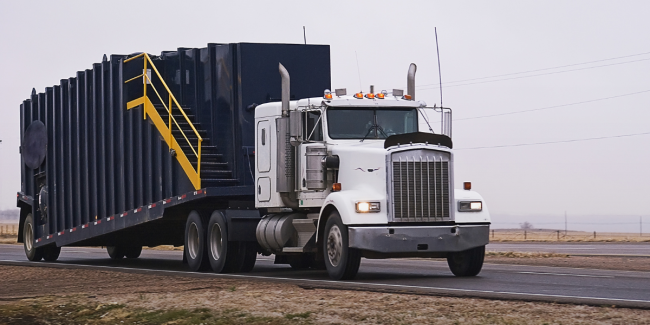
What is Heavy Haul Trucking?
Heavy haul trucking is the secret to moving some of the biggest and toughest loads out there. From massive construction equipment to oversized industrial machinery, this type of trucking makes sure these hefty items reach their destinations safely and on time.
What is Considered a Heavy Haul?
Heavy haul trucking involves transporting oversized or exceptionally heavy loads that are too large or heavy for standard freight. Generally, what qualifies as heavy haul can vary based on regulations and equipment, but it typically includes:
1. Dimensions– Loads that exceed standard size limits, such as those wider than 8.5 feet, taller than 13.5 feet, or longer than 50 feet, often require heavy haul trucking.
2. Weight– Loads that surpass the standard weight limits for regular trucks, usually exceeding 80,000 pounds, fall into the heavy haul category. This includes massive machinery, large components, or bulky materials.
3. Special Requirements– Items that need specialized equipment for transport, like multi-axle trailers or lowboy trailers, due to their size or weight.
For big infrastructure projects like building bridges, highways, and skyscrapers, heavy haul trucking is crucial for transporting massive machinery and materials.
In manufacturing and industrial operations, it helps move large machines, generators, and other components that keep production lines running smoothly.
In the energy sector, whether it’s oil, gas, or renewable energy, heavy haul trucking is vital for getting oversized equipment like wind turbine blades and drilling rigs to where they’re needed.

What All is Involved?
Heavy hauling involves a few moving gears to get those big loads where they need to go.
Handling Specialized Equipment
Heavy haul trucking relies on specially designed trucks and trailers to manage large and cumbersome loads. This includes lowboy trailers, which have a lower deck height to accommodate tall items, and extendable flatbeds that can adjust in length to fit oversized cargo. Multi-axle trucks are also used to distribute the weight of extremely heavy loads more evenly, ensuring safe transport and reducing the risk of damage to roads and bridges.
Customized Route Planning
Over-dimensional trucking frequently demands customized route planning to navigate around obstacles that can’t accommodate oversized cargo. This might involve avoiding certain roads, bridges, or tunnels that are not suited for heavy or wide loads. Route adjustments are carefully planned to ensure that the transport can proceed smoothly and safely, often requiring detailed pre-trip planning and coordination to avoid potential hazards and restrictions.
Permitting and Regulations
Because of their size and weight, heavy haul loads must meet strict regulations and often require special permits. These permits ensure the transport complies with legal standards, including weight limits, height restrictions, and road safety requirements. Adhering to these regulations is crucial for avoiding fines and ensuring the safety of the transport and other road users.
Coordination with Authorities
Working closely with local authorities is important for compliance and ensuring a smooth transport process. This often involves coordinating with state and local transportation departments, providing detailed information about the load, and scheduling any necessary escorts or road closures.
Load Securement
Properly securing the load helps prevent accidents and damage during transit. This involves using equipment like chains, straps, and bracing techniques to stabilize and support the cargo. Ensuring the load is evenly distributed and securely fastened helps prevent shifting and maintains safety on the road.
How a Logistics Partner Like DAL Can Help
Navigating the complexities of heavy haul trucking can be challenging. Here’s how a logistics company like DAL can make a difference:
- Expertise and Experience- Logistics companies with experience in heavy equipment hauling have the knowledge and skills to manage oversized loads efficiently.
- Access to Specialized Equipment- They have access to the right equipment and technology needed for safe and effective transportation.
- Streamlined Permitting- They can handle the permitting process and coordinate with authorities to ensure all regulations are met.
- Route Optimization- Logistics partners can optimize routes and handle any route adjustments to avoid obstacles and ensure timely delivery.
If it’s time to tackle your next heavy haul project, contact the team at DAL to learn how our expertise in heavy haul trucking can help you transport your large and challenging loads with ease.